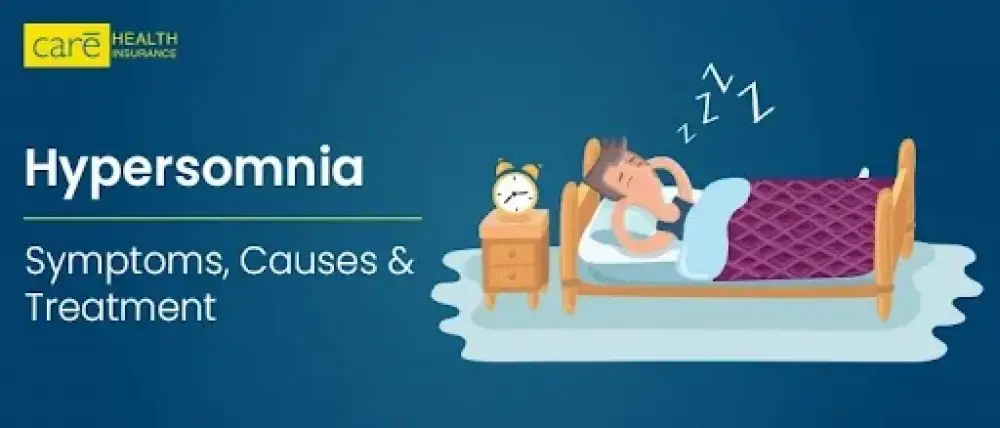Subscribe to get weekly insights
Always stay up to date with our newest articles sent direct to your inbox
Published on 20 Nov, 2024
Updated on 27 Mar, 2025
597 Views
3 min Read

Written by Nidhi Goyal
0Like
Be the First to Like
The more you follow the clock, the more sorted your life becomes.
There is always a right time for everything.
Literally, everything.
Sleep falls into the same category. You might have missed your grandchild’s first steps, or your milk spilt when you got a gust of sleep.
Sleep is an essential part of our lives. The significance of sleep timings and quality can’t be ignored for someone who wants to live a healthy lifestyle. Insomnia prevents you from sleeping at night, but hypersomnia is also hard to live with. Riva could fall asleep immediately, even in front of a noisy television or an energetic crowd of kids causing a stir. Many times, she has had difficulty waking up. Despite all this, she was a relatively active and regular girl.
This blog will discuss hypersomnia meaning, its causes, symptoms and treatment. Stay tuned to learn more about it.
Hypersomnia, or excessive sleepiness, is when you feel sleepy during the day. Excessive daytime sleepiness leaves you with no control over your sleep. All the 24 hours become your sleeping hours. You may fall asleep anytime of the day. It is not life-threatening, but it snatches little, sweet moments from your life. According to research, 4% to 6% of the general population is suffering from hypersomnia. The syndrome is more prevalent in men as compared to women because of sleep apnea. People with hypersomnia find it difficult to function properly during the day, which affects their energy levels and concentration.
This insufficient sleep syndrome can be caused when a person fails to get sufficient sleep persistently. Night shift work and poor sleep hygiene may reduce the amount and quality of sleep.
Potential causes of hypersomnia include autonomic nervous system dysregulation and certain medications. Excessive alcohol or drug use may be counted as a possible cause of hypersomnia. Also, some medical conditions like head injuries, tumours, epilepsy, encephalitis, and more may develop hypersomnia with time.
Primary Hypersomnia: When hypersomnia is due to a neurological reason or a symptom of narcolepsy.
Secondary Hypersomnia: Other medical conditions like depression, tumours, drugs, nerve damage, alcohol, multiple sclerosis, and sleep apnea.
Idiopathic Hypersomnia: There is no clear reason for feeling exceptionally sleepy. It is called idiopathic hypersomnia.
What are the Common Hypersomnia Symptoms?
People suffering from hypersomnia strongly desire to sleep at inappropriate times, in the middle of a social obligation, a conversation, or during work or school. This neurological disorder negatively affects a person’s personal or professional life to a great extent.
• Heightened anxiety
• Frequent napping
• Irritability
• Difficulty concentrating
• Decreased alertness
Diagnosis of Hypersomnia
How is hypersomnia diagnosed? Some of the popular means are-
1. Multiple Sleep Latency Test: It measures how long a person takes to fall asleep.
2. Polysomnography: It is based on sleep history and an overnight polysomnogram (PSG). This examination records breathing, body movements, heart rate, and brain waves during sleep. A sleep specialist may help you interpret the results.
3. Sleep Questionaries: These questionnaires are valuable tools for identifying your sleep habits and symptoms. Family members can provide helpful insights and contribute additional details. A doctor’s interpretation of the results enables a better understanding of underlying issues and appropriate treatment.
If you are diagnosed with severe symptoms of hypersomnia, then you may need to get regular and proper treatment. It may add to your monthly expenses if you haven’t insured yourself. Several health insurance service providers offer discounts on consultation and diagnostics and treatment. So, a health insurance policy can provide financial security by buying your risk.
Lifestyle changes: Lifestyle changes, more than regular exercise and reducing stress can also help maintain your sleep hours.
Hypersomnia Medication: The most common medicines prescribed for hypersomnia are Modafinil (Provigil) and Armodafinil (Nuvigil). These will help you stay awake during the day. Other suggested medicines are Flumazenil, Pitolisant, and Clarithromycin (Biaxin XL), Sodium oxybate (Xyrem, Lumryz) and Methylphenidate (Quillivant XR, Daytrana, others).
You can self help hypersomnia with some small changes in your routine and habits-
1. Create a peaceful sleep environment
2. Keep a regular sleep schedule
3. Evaluate your medications
4. Be careful about driving
5. Avoid working night shifts
>>Read More: Sleep Apnea: Causes, Symptoms & Treatment
Hypersomnia can cause difficulty waking up, falling asleep during the day. People with kidney conditions, depression, kidney and low thyroid function are most at the risk of developing hypersomnia. The treatment is based on the causes, so, gauge them correctly.
Disclaimer: The above information is collected from generic sources, thus,doesn’t substitute for a qualified medical opinion. Also, all plan features, benefits, coverage, and claims underwriting are subject to policy terms and conditions.Refer to the brochure, sales prospectus, and policy documents carefully.
Be the First to Like
शुगर कंट्रोल कैसे करे? जानें, डायबिटीज में क्या खाना चाहिए Care Health Insurance in Health & Wellness
Thyroid : मामूली नहीं हैं महिलाओं में थायराइड होना, जानें इसके लक्षण और घरेलू उपचार Care Health Insurance in Diseases
हाई ब्लड प्रेशर को तुरंत कंट्रोल कैसे करें? देखें इसके उपाय Care Health Insurance in Diseases
प्लेटलेट्स की कमी के लक्षण, कारण और इलाज क्या है Care Health Insurance in Diseases
What is Endocrinology? Hormones, Disorders & Treatment Care Health Insurance in Diseases
Do People with Mental Illness Have Less Heart Disease? Care Health Insurance in Diseases
एक्जिमा क्या है? देखें, इसके लक्षण और इलाज Care Health Insurance in Diseases
Guillain-Barré Syndrome (GBS): Causes, Symptoms and Treatment Care Health Insurance in Diseases